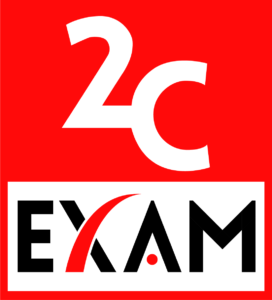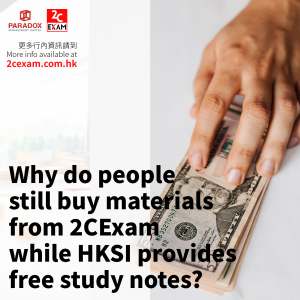What are the contents of the HKSI LE exam papers?
The Licensing Examination for Securities and Futures Intermediaries (HKSI LE) paper 1 is considered as the basic course for aspiring Securities and Futures Practitioners. Anyone who wishes to enter the industry – after the emergence of the securities examination system needs to take the exam at least once. The exam scope for paper 1 is very broad, the content includes economics, financial products, regulatory frameworks, laws and codes, etc. The topics and concepts mentioned above are things candidates must have a basic knowledge of before entering the industry. The HKSI study manual for paper 1 has more than 300 pages, divided into 9 chapters, and requires a lot of recitation, but there are no calculation questions.
The examination content of Paper 7 to Paper 12 is dedicated to a particular concept, which is an extension of some basic knowledge of Paper 1. Paper 7 and 8 are relatively easy and shorter in length. However there are some mathematical calculation questions; if candidates have a poor foundation in mathematics during their primary and secondary school years, candidates may need more time to comprehend the calculation questions. The number of mathematical calculation questions are relatively more in paper 11 compared to paper 7, in saying so, the number of calculation questions in paper 11 is less than 10 questions (the total number of questions is 40). The mathematical questions asked are actually not difficult, but candidates must be clear in mathematical logic. The requirements for your understanding and ability to relate to numbers are the same as paper 7 and paper 8; paper 11 also requires candidates to recite many formulas. Paper 9 and 12 are more challenging, but the content itself is relatively short and the manual has only less than 200 pages of information, but many students will fail in these 2 sets of papers.
What is the recommended exam order? Can I take multiple exams at the same time?
We recommend that students take paper 1 first because learning would be more effective if one acquires new knowledge starting from the basics first. Paper 1’s content is relatively simple since the content also includes an explanation of the relationship between different concepts; therefore, partaking in paper 1 first allows the candidate to have a relatively macro and clearer mind map of various concepts. Students who have applied to partake in the securities exam will often ask if all three exam papers will be taken in one exam? The answer is no. Each exam paper needs to be conducted independently, and no more than one exam paper should be taken in the same exam session. Moreover, each exam paper has unique content. Considering that people’s short term memory is limited, we recommend that students reserve study period for each paper; in this way they will be able to have sufficient time to conduct their revision, as well as prevent any confusion that may arise.

Revision Tips
- Make good use of colours helps with memory!
Studies have shown that good use of colour when writing notes can greatly improve the efficiency of the revision process. For example, the effect of writing only in black will greatly affect the efficiency of the revision and memorising process. According to experts’ suggestions, using blue, yellow, green, and red pens or highlighters to write or take notes can strengthen one’s memory.
It is recommended that students use a blue pen if they need to memorise concepts and content that they have never seen before. Use a yellow pen if students have some knowledge regarding a topic, but don’t know much about it. Use a green pen if you are gradually having a more thorough understanding of the concept, but only acquired superficial impressions on the topic. You can use a red pen if you can understand the topic thoroughly and are able to memorise the content well.
2. Pomodoro Technique
After deciding what to study, set a routine, such as rest for 3-5 minutes after 25 minutes of studying; repeat this cycle for 4 times; after the 4 cycles are finished, rest for 15 minutes and repeat the routine cycles again. As long as you are determined enough, this method will tremendously help students achieve better revision effects.

3. Have enough sleep and drink plenty of water
The human body is very scientific. If you have enough rest and drink enough water, your body’s functions will also tend to be better; in this way, your brain functions will also be more effective. Therefore, although the phrase “maintaining good health” is clichéd, this saying is quite true.
4. Drink water during the exam
If drinking is allowed in the exam, the candidate can bring in some water to the exam and drink it when needed. Drinking water will help refresh one’s mind and relieve anxiety. In contrast, if drinking is not allowed in the exam, candidates can opt to drink a little bit of water before entering the exam arena. Remember to drink the water with a reasonable amount and frequency, as drinking too much will cause one to go to the bathroom more frequently. We do not recommend students to drink energy drinks because the caffeine in them is diuretic and will cause students to go to the bathroom more frequently. The refreshing effect of energy drinks is usually less than 1 hour. After the effect fades, you will get tired more easily, which may affect your performance in the later part of the exam.
5. It is strongly not recommended that candidates only review the exam questions. Don’t just recite the questions. Spend more time understanding the content of the exam instead
Some candidates who lack the time or are lazy will tend to adopt the method of memorising the exam questions and not learning the concept itself to cope with the exam. In fact, the effects of this kind of revision method may not be good enough. If candidates only rely on memorizing the answers to the questions without understanding the underlying principles, and if the same exam questions are rephrased or have been changed to an application-based question, there is a large chance that the candidate might not be able to know how to answer the question. Furthermore, the scope of the insurance exam does not allow candidates to memorize so many concepts they have not understood by rote. Candidates who are not gifted with an extraordinary retentive memory should not take the risk of taking the exam without any revision, as that would waste their time and chance.
How can we help?
2CExam provides HKSI LE, IIQE, EAQE and SQE related exam preparation materials. We sell mock question banks for IIQE Papers 1, 2, 3, 5 and MPFE in Chinese and English; and bibles for IIQE Papers 1, 2, 3, MPFE in Chinese. We also offer 1 on 1 tutorial services. Besides, we have also made free tutorial videos for IIQE Papers 1, 2, 3 and MPFE and posted on public channels such as Youtube/ Bilibili/ Tencent/ Iqiyi. 2CExam has been an exam training expert for years. Should you need any help please visit www.2cexam.com or contact us through:
Phone +852 2110 9644 Email: [email protected] Wechat: hk2cexam WhatsApp: +852 9347 2064
Please support us by leaving comments and likes if you think this article helps you!
You can scan or click on the QR codes to visit our social media.
Latest Article
Categories
過往文章
Contact US
-
Phone:
+852 2110 9644
-
Email:
-
WhatsApp
+852 9347 2064
-
WeChat
hk2cexam
Interesting Articles
Which license is required for bank employees engaged in securities business?
Should Hong Kong bank employees apply for an HKMA license or an SFC license? According to the licensing requirements for real estate practitioners, passing relevant qualification exams is a necessary condition for obtaining a real estate agent (individual) license or a salesperson license. The Hong Kong Securities and Futures Practitioners Qualification Exam (HKSI LE) is…
What is the difference between an SFC license and HKMA registration in Hong Kong?
What is the difference between an SFC license and HKMA registration in Hong Kong? In Hong Kong, the statutory organization responsible for regulating the securities and futures markets is the Securities and Futures Commission (SFC). The Securities and Futures Ordinance, which came into effect on April 1, 2003, grants the SFC regulatory authority over the…
What is an HKSI certificate?
What is an HKSI certificate? What is the use of an HKSI exam transcript? What is an HKSI certificate? Do I need an HKSI exam transcript or an HKSI certificate when applying for SFC registration? To work in the securities industry in Hong Kong, passing the Hong Kong Securities and Futures Commission (SFC) Licensing Exam…
How to obtain an exemption for the HKSI LE Securities and Futures Practitioners Qualification Examination?
How to obtain an exemption for the HKSI LE Securities and Futures Practitioners Qualification Examination? In the previous issue, we talked about how if someone wants to work in the securities industry in Hong Kong, they must first pass the Hong Kong Securities and Investment Institute’s (HKSI) Licensing Examination for Securities and Futures Intermediaries. Are…
Where can I register for securities exams in Hong Kong?
Where can I register for securities exams in Hong Kong? If you want to work in the securities industry in Hong Kong, you must pass the Securities and Futures Commission (SFC) Licensing Exam LE. The organization that conducts the Licensing Exam LE in Hong Kong is the Hong Kong Securities and Investment Institute (HKSI). The Hong…
Often hear the beautiful ladies and handsome gentlemen in the Hong Kong financial sector talking about the “178 license” they need to obtain. What exactly is it?
What is the Hong Kong 178 license? In fact, the 178 license is not a real license but refers to a combination of examination papers that need to be taken. It consists of the Hong Kong Securities and Futures Practitioners Qualification Examination Paper 1, Paper 7, and Paper 8. In Hong Kong, activities related to…
What is the SFC license in Hong Kong?
What is the SFC license in Hong Kong? The Securities and Futures Commission (SFC) of Hong Kong was established in 1989 as an independent statutory body responsible for regulating the securities and futures markets in Hong Kong. The Securities and Futures Ordinance and its subsidiary legislation grant the SFC the power to investigate, correct, and…
Why do people still buy materials from 2CExam while HKSI provides free study notes?
In addition to organizing LE exams, the HKSI will also provide students who take the LE exam with the exam coverage called the Study Note. It depicts what is covered in the exam with hundreds of pages and full of paragraphs. It is lengthy and contains a lot of data and examples that will not…
EAQE/ SQE Real Estate Agency Exam Coverage/ Scope for Revision
Many students are clueless about the exam coverage / scope for doing revision on the Estate Agent Qualifying Examination (EAQE) and Salesperson Qualifying Examination (SQE). VTC’s PEAK does not have any notes available for candidates to download. In fact, the scope of the exam is quite extensive. Some of the coverage can be downloaded from…
Is success an Unattainable Ideal in the Real Estate Industry? 10 Benefits of Being in the Real Estate Industry Can Stimulate Your Capacity
Is it difficult to succeed in the real estate industry? Living space is one of the indispensable elements in life. From the wealthy speculating and selling flats to ordinary people looking for a place to live, most Hong Kong people have the demand to rent or even invest in the real estate market. Hong Kong’s…






